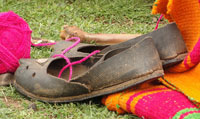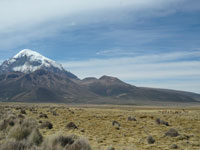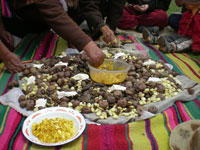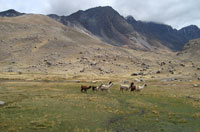ABARCAS: Rubber sandals used by the peasants on the Altiplano
ACHACHILA: Grandfather. The Aymara spirit that protects the people.
"¿A CÓMO ES?": Expression used to ask how much something costs.
AFRO BOLIVIANO: Descendent of African slaves. The Afro-Bolivian communities are found primarily in the Yungas.
AGUAYO: Traditional Bolivian cloth
AJAYU: Soul
ALPACA: Andean camelids that have the finest, warmest wool.
ALPACA (2): zinc, copper and nickel alloy.
ALTIPLANO: Andean plain located at 4000 meters above sea level (MASL).
ALTO PERÚ: Name that was used during the colonial period (until 1825) for what is now Bolivia.
AMBROSÍA: Drink from southern Bolivia which is a mixture of fresh milk and singani (grape brandy).
ANTICUCHO: beef heart brochette.
APACHETA: Stone altar for offerings to the pachamama and achachila. The person approaching the apacheta should pick up a stone, rub it on a part of the body to transfer his/her weariness to it and recover his/her energy.
APTAPI: Community table
APU: Spirit of the mountain
ARENALES: Sand dunes
AUDIENCIA DE CHARCAS: The highest court of the Spanish Crown in Alto Peru during the 16th century.
AIMARA: (Aymara) 1. Pre-colonial Andean people; 2. Pre-colonial Andean language.
BAJÓN: Wooden wind instrument
BALSA: 1. boat 2. wood 3. Tree that produces the wood used for small boats.
BARRANQUILLERO: Gold prospector
BLOQUEO: Highway blockade set up as protest or demonstration
BOFEDALES: swampy highland
BOLICHE: Bar, night club, discotheque
BOLIVIANITA: gemstone found in only in eastern Bolivia, amethyst/citrine (violet/green quartz)
BOLIVIANO/PESO/LUCA: Bolivian currency
BUÑUELOS: Sweet fritters
BUS CAMA: Comfortable bus with seats that recline to 180º


